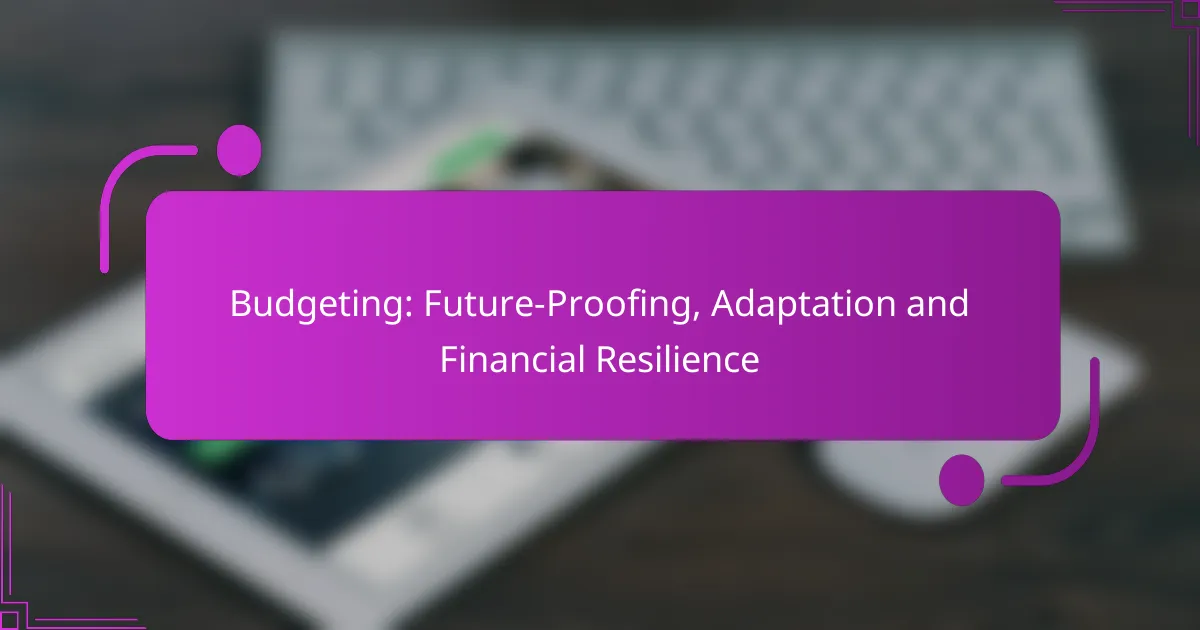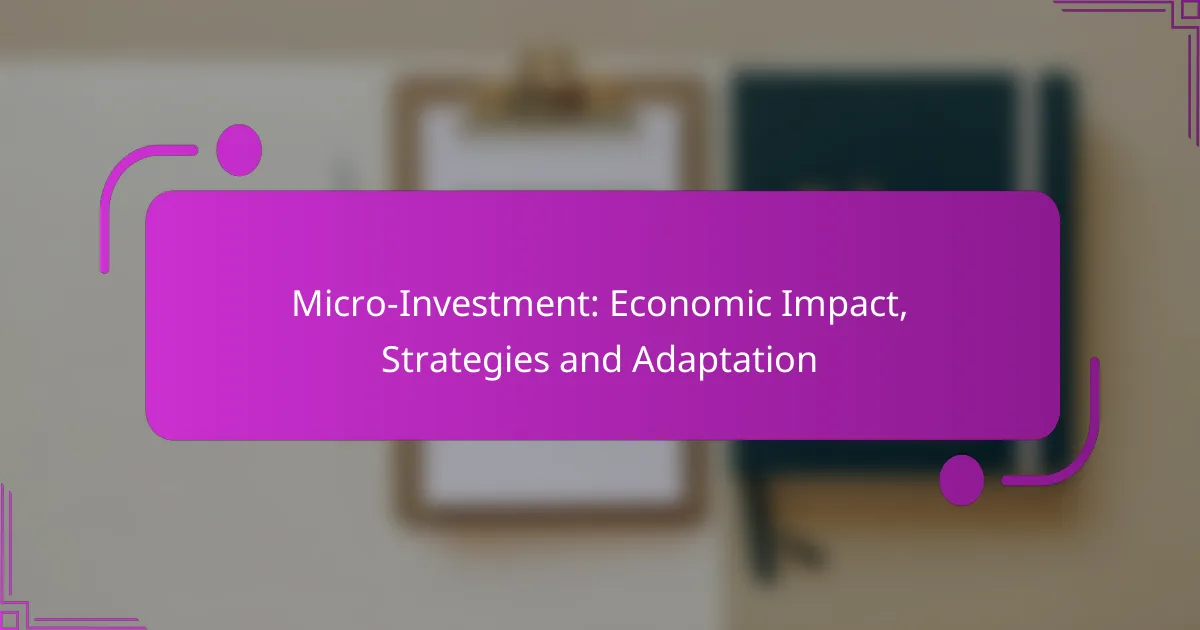Budgeting is a vital tool for enhancing financial resilience, offering a structured way to manage income and expenses while preparing for unforeseen challenges. By allocating resources wisely, individuals can build a safety net that reduces reliance on credit during tough times and promotes adaptability in the face of economic changes.
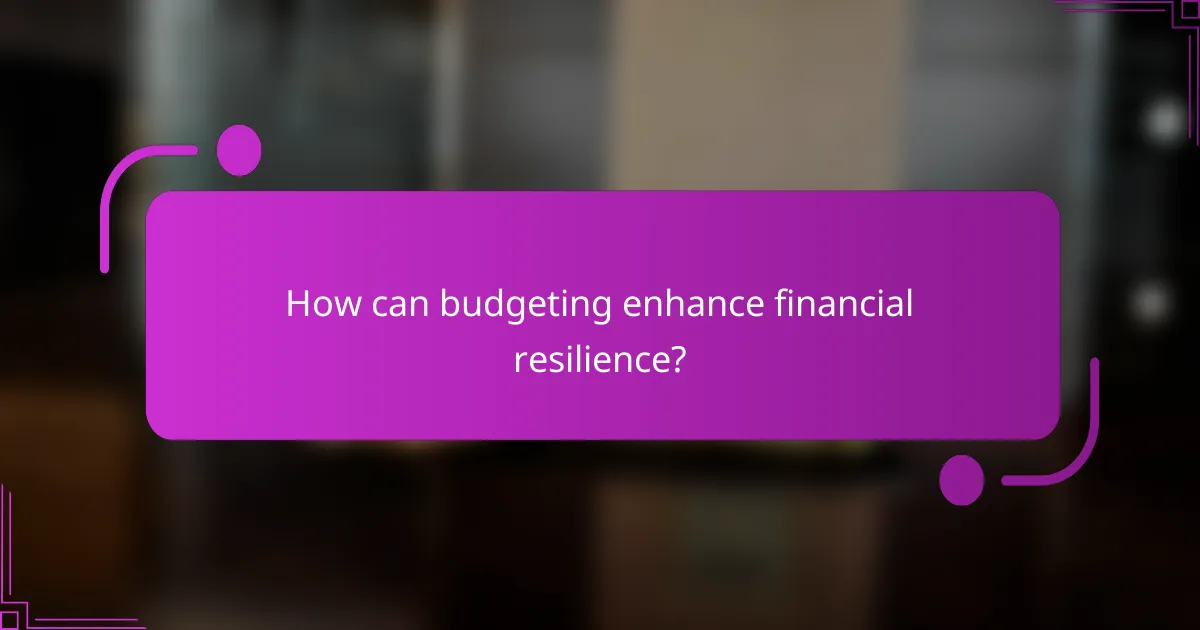
How can budgeting enhance financial resilience?
Budgeting enhances financial resilience by providing a structured approach to managing income and expenses, allowing individuals to prepare for unexpected financial challenges. By effectively allocating resources, budgeting helps build a safety net and reduces reliance on credit during tough times.
Improved cash flow management
Effective budgeting leads to improved cash flow management by tracking income and expenses meticulously. This allows individuals to identify spending patterns and adjust accordingly, ensuring that essential expenses are prioritized while discretionary spending is minimized.
For instance, using a budgeting app can help visualize cash flow trends, making it easier to spot potential shortfalls before they occur. Regularly reviewing and adjusting the budget can help maintain a positive cash flow, which is crucial for financial stability.
Emergency fund establishment
Establishing an emergency fund is a vital component of budgeting that enhances financial resilience. This fund acts as a financial buffer, covering unexpected expenses such as medical emergencies or job loss without resorting to debt.
A common recommendation is to save three to six months’ worth of living expenses in a separate, easily accessible account. Setting aside a small percentage of each paycheck can gradually build this fund, providing peace of mind and financial security during unforeseen circumstances.
Debt reduction strategies
Budgeting plays a crucial role in implementing effective debt reduction strategies. By allocating a portion of monthly income specifically for debt repayment, individuals can systematically reduce their outstanding balances and improve their overall financial health.
Consider using the snowball method, where smaller debts are paid off first to build momentum, or the avalanche method, which focuses on paying off high-interest debts first. Both strategies can be integrated into a budget to ensure consistent progress towards becoming debt-free.

What budgeting methods are effective for future-proofing?
Effective budgeting methods for future-proofing include strategies that promote financial adaptability and resilience. These methods help individuals and businesses allocate resources wisely, ensuring they can respond to unexpected changes in income or expenses.
Zero-based budgeting
Zero-based budgeting (ZBB) requires you to start from a “zero base” each budgeting period, meaning every expense must be justified for each new period. This method encourages careful evaluation of all costs and can help identify unnecessary expenditures.
To implement ZBB, list all expenses and prioritize them based on necessity. For example, if your monthly income is $3,000, allocate funds to essential categories like housing, food, and transportation first, ensuring that every dollar is accounted for by the end of the month.
Be cautious of the time commitment required for ZBB, as it can be more labor-intensive than other methods. Regular reviews can help maintain its effectiveness.
50/30/20 rule
The 50/30/20 rule is a straightforward budgeting method that divides your after-tax income into three categories: 50% for needs, 30% for wants, and 20% for savings and debt repayment. This approach simplifies financial planning and helps ensure a balanced allocation of resources.
For instance, if your monthly income is $4,000, you would allocate $2,000 for needs (like rent and utilities), $1,200 for wants (like dining out and entertainment), and $800 for savings or debt repayment. This method allows for flexibility while promoting savings.
However, be mindful that personal circumstances may require adjustments to these percentages. Regularly reassessing your financial situation can help you stay on track.
Envelope system
The envelope system is a cash-based budgeting method where you allocate specific amounts of cash into envelopes designated for different spending categories. This tangible approach can help control spending and prevent overspending in any category.
To use the envelope system, determine your budget categories and set a cash limit for each. For example, you might allocate $300 for groceries, $150 for entertainment, and $100 for clothing. Once the cash in an envelope is gone, you cannot spend any more in that category until the next budgeting period.
While effective, this method may not work well for all expenses, especially those that are paid electronically. Consider combining it with digital tools for a more comprehensive approach.
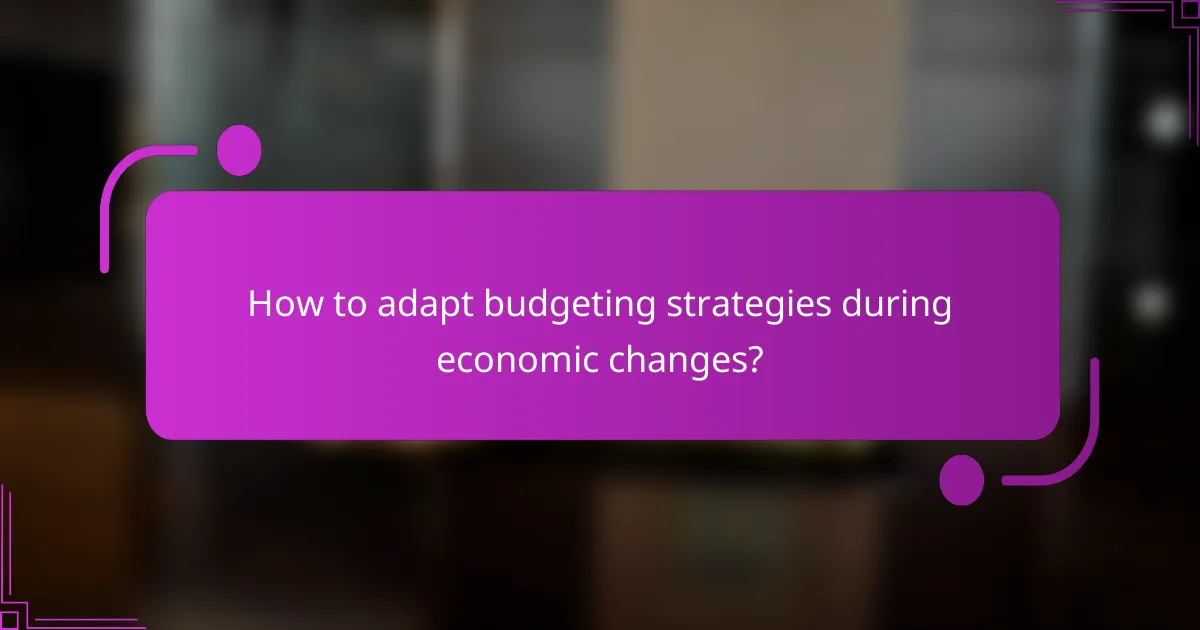
How to adapt budgeting strategies during economic changes?
Adapting budgeting strategies during economic changes involves regularly reassessing your financial situation and adjusting your spending and saving habits accordingly. This proactive approach helps maintain financial resilience and ensures you can navigate uncertainties effectively.
Regular financial reviews
Conducting regular financial reviews is essential for adapting your budgeting strategies. Schedule monthly or quarterly check-ins to evaluate your income, expenses, and savings goals. This practice allows you to identify trends, adjust for any changes in your financial situation, and make informed decisions about your budget.
During these reviews, consider comparing your actual spending against your budgeted amounts. This can highlight areas where you may need to cut back or reallocate funds to meet your financial goals more effectively.
Flexible expense tracking
Implementing flexible expense tracking can help you respond to economic changes swiftly. Use budgeting apps or spreadsheets that allow you to categorize and monitor your spending in real-time. This flexibility enables you to adjust your budget as necessary, accommodating unexpected expenses or shifts in income.
Consider setting aside a portion of your budget for discretionary spending that can be adjusted based on your financial situation. This approach helps maintain balance and ensures you can still enjoy some financial freedom even during tighter times.
Scenario planning
Scenario planning involves preparing for various potential economic conditions by creating different budget scenarios. This technique helps you visualize how changes in income or expenses could impact your financial health. For example, consider a scenario where your income decreases by 20% and outline how you would adjust your budget accordingly.
Developing a few key scenarios can help you identify necessary adjustments in advance, such as reducing discretionary spending or increasing savings. This preparedness can enhance your financial resilience and provide peace of mind during uncertain times.
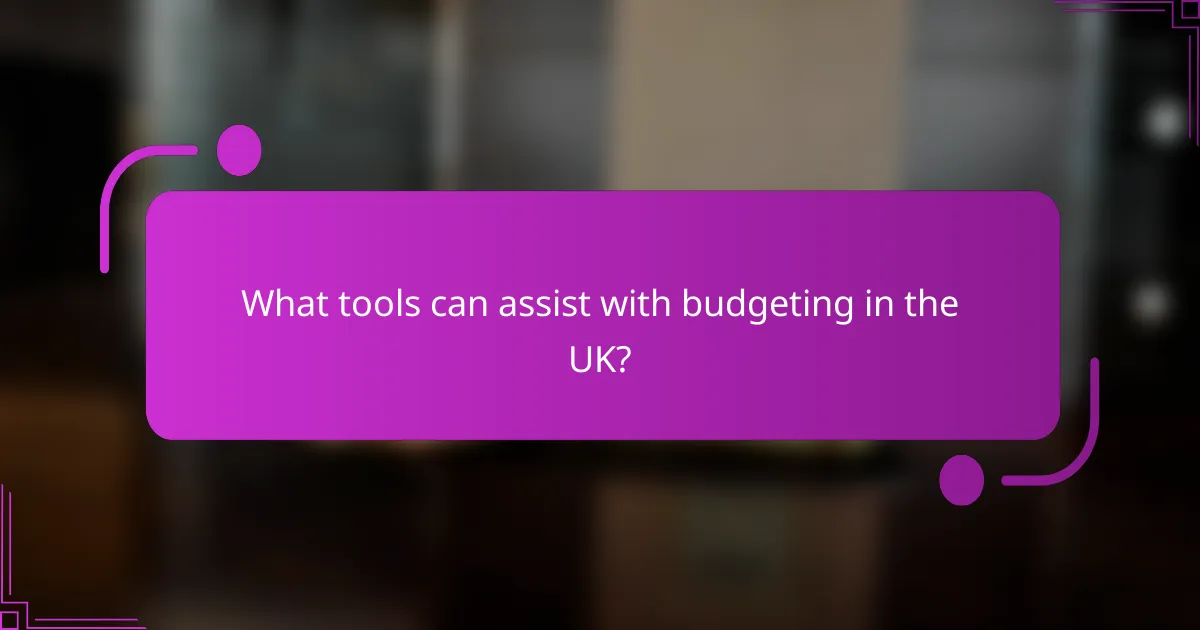
What tools can assist with budgeting in the UK?
Several budgeting tools can help individuals in the UK manage their finances effectively. These tools range from apps that track spending to comprehensive budgeting software that encourages proactive financial planning.
Mint for budgeting
Mint is a popular budgeting tool that allows users to track their expenses and manage their finances in one place. It connects to bank accounts, credit cards, and bills to provide a complete overview of financial health.
Users can set budgets, receive alerts for unusual spending, and view financial trends over time. Mint is free to use, making it an accessible option for many individuals looking to improve their budgeting skills.
YNAB (You Need A Budget)
YNAB is a budgeting software designed to help users take control of their money by assigning every pound a job. This proactive approach encourages users to plan for both monthly expenses and long-term financial goals.
While YNAB requires a subscription fee, many users find its structured methodology beneficial for building financial resilience. The platform also offers educational resources to help users develop better budgeting habits.
EveryDollar app
EveryDollar is a straightforward budgeting app that focuses on zero-based budgeting, where users allocate all their income to expenses, savings, and debt repayment. This method helps ensure that every pound is accounted for.
The app offers a free version with basic features, while the paid version includes bank syncing for easier tracking. EveryDollar is user-friendly, making it suitable for those new to budgeting.
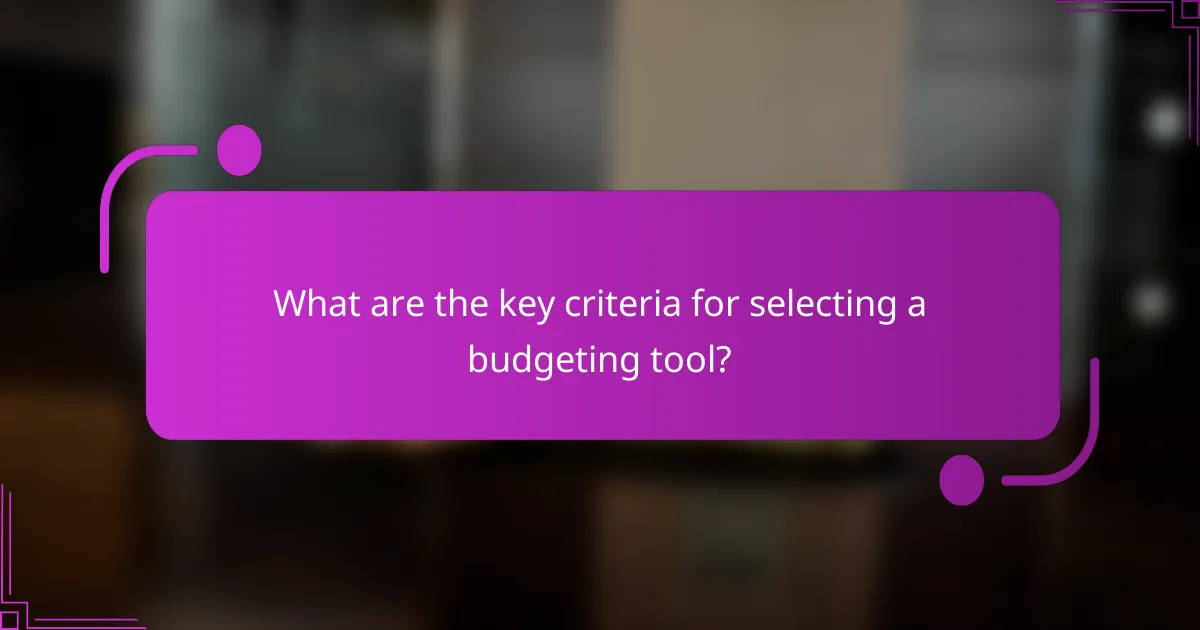
What are the key criteria for selecting a budgeting tool?
When selecting a budgeting tool, prioritize user interface, integration capabilities, and cost structures. These criteria will significantly impact usability, efficiency, and overall satisfaction with the tool.
User interface and experience
A user-friendly interface is crucial for effective budgeting. Look for tools that offer intuitive navigation, clear visuals, and customizable dashboards to suit your preferences. A well-designed experience can save time and reduce frustration.
Consider tools that provide mobile applications, allowing you to manage your budget on-the-go. This flexibility can enhance your engagement with the budgeting process and help maintain financial discipline.
Integration with bank accounts
Integration with bank accounts is essential for real-time tracking of income and expenses. Choose budgeting tools that can sync with multiple financial institutions to automatically import transactions, minimizing manual entry.
Ensure the tool supports secure connections and complies with relevant data protection regulations. This will safeguard your financial information while providing a comprehensive view of your financial situation.
Cost and subscription models
Evaluate the cost and subscription models of budgeting tools to find one that fits your budget. Many tools offer free versions with basic features, while premium versions may range from $5 to $20 per month, depending on the features provided.
Consider whether a one-time purchase or a subscription model aligns better with your financial habits. Be cautious of hidden fees or charges that may arise, especially with premium features or additional services.
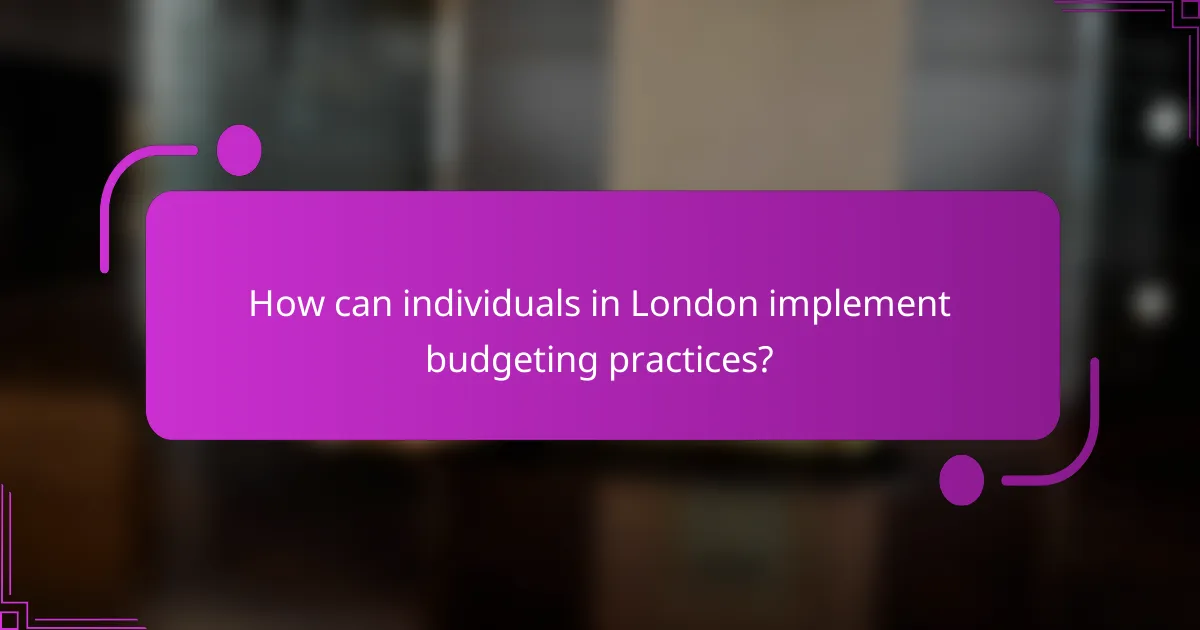
How can individuals in London implement budgeting practices?
Individuals in London can implement effective budgeting practices by leveraging local resources, attending workshops, and seeking community support. These strategies help in creating a sustainable financial plan that adapts to changing circumstances.
Local workshops and seminars
London offers various workshops and seminars focused on budgeting and financial management. These events typically cover topics such as personal finance basics, expense tracking, and savings strategies. Many are free or low-cost, making them accessible to a wide audience.
Participants can expect to learn practical skills, such as how to create a budget, set financial goals, and manage debt. Local organizations, including banks and community centers, often host these events, providing valuable networking opportunities.
Community financial counseling
Community financial counseling services in London provide personalized support for individuals looking to improve their budgeting skills. These services often include one-on-one sessions with certified financial counselors who can offer tailored advice based on individual circumstances.
Counseling sessions may cover a range of topics, from creating a budget to understanding credit scores and debt management. Many organizations offer these services at little to no cost, ensuring that financial guidance is accessible to everyone, regardless of income level.
